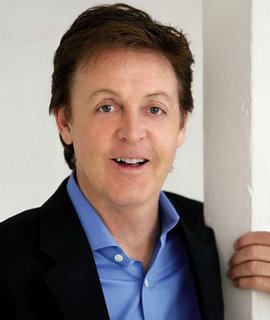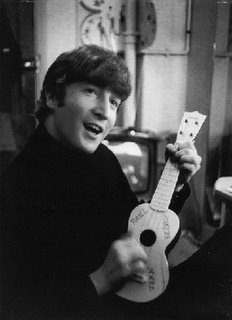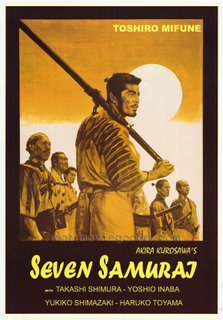 Follow Me
Follow Me
You lift up my spirits, you shine on my soul
Whenever I'm empty, you make me feel whole
I can rely on you, to guide me through, any situation
You hold up a sign that reads, follow me.
You give me directions, you show me the way
You give me a reason, to face every day
I can depend on you, to send me to, any destination
You hold up a sign that reads, follow me, follow me.
Down the track of loneliness, down the path of love
Through the woods of heartache, to the end
On the shores of sorrow, where the waves of hope crash in
The perfect place for me to find a friend.
You lead me to places, that I've never been
Uncovering secrets, that I've never seen
I can rely on you, to guide me through, any situation
You hold up a sign that reads, follow me, follow me,
Follow me, follow me,
Follow me, follow mePaul McCartney, Christian?Are these the words of a CCM (Contemporary Christian Music) songwriter, say, Steven Curtis Chapman, or Jars of Clay? Though these words sound like they could be the words of a Christian songwriter, they are actually from the pen of none other than Sir Paul McCartney. The lyrics from Paul's song "Follow Me", off his latest album, the Grammy-nominated "Chaos and Creation in the Backyard", suggest that Paul McCartney is writing from personal religious experience. Yet in interviews, McCartney has often affirmed that he is not religious, at least not in an orthodox sense.
For example, in an interview published in the November 2005 issue of Reader's Digest Canada, Paul said:
"I believe in the spirit of goodness, so I can sympathize with Christians, Jewish people, Buddhists, Muslims. I think essentially they're all trying to say the same thing: You ought to choose between good and bad...
I don't subscribe to any one religion, but I do feel a oneness with a spirit of goodness. But I don't know if there's an old man with a beard in the sky"Still, the lyrics of "Follow Me" do
sound Christian, especially in Paul's use of the phrase "follow me" (a direct quote of Jesus), and also in the way the lyrics describe what seems to be a personal relationship with God (a subject very common in CCM).
What I find interesting is that McCartney, who in his own words does not "subscribe to any one religion", would write an "inspirational" song with such strong religious, and particularly Christian, connotations.
"Never Discuss Religion or Politics"At the official Paul McCartney website, the community forum recently participated in what became a quite heated (at times) discussion of this particular song. The person who began the discussion thread identified himself as Christian, and said he found it interesting that "Follow Me", like other songs Paul has written (Let It Be, for example), has such strong Christian overtones. He asked for feedback, and while many agreed with his initial observation, the thread soon veered into various argumentative tangents (among the questions debated were: is Paul really a Christian, in any sense of the word; what is the definition of the word "Christian"; what does it mean to really be a Christian, anyway; and why not just enjoy the music and not bring Paul's religious beliefs into it).
Some participants in the discussion were deeply offended at the idea that Paul might identify himself as Christian, and seemed all bent out of shape at the mere suggestion of such a notion. Others insisted that Paul is closer to being Christian than to any other religion. I threw my own "two-cents" into the discussion, responding to a narrow technical definition of the term "Christian" that someone was offering, by stating that a Christian is more than just someone who takes the name "Christian", and isn't born into it in the same way that one is born a citizen of a country. Rather, a Christian is someone whose faith in Christ results in their developing a certain way of life, one that follows the way of Christ.
Why were people so riled up by this discussion? What is it about the name of Christ, or the subject of Christianity, that makes people so uncomfortable, so hostile and reactive?
Paul's Faith, In His Own WordsIt seems quite clear from Paul's words on the subject that he is not a Christian-- and yet many, including myself, find that in his music there is a spiritual component that suggests that he is a "spiritual person", i.e., that he believes in some sort of spirituality. In interviews he confirms this. For example, in the following excerpt (from another 2001 Reader's Digest interview given shortly after the death of his wife Linda), Paul was questioned about the inspiration behind his music.
RD: You've said in the past that "Yesterday" emerged fully formed from a dream. What do you make of that? What is your personal understanding of inspiration?
McCARTNEY: I don't understand it at all. But I love it. I think life is quite mysterious and quite miraculous. I mean, when I saw my first baby, Mary, born, I remember just thinking "That is magic." I know how we did it. But there's still a miracle happening. I still don't know how I write songs. And I don't want to know. Every time I come to write a song there's this sort of magic little thing where I go, "Ooh, ooh, it's happening again. Ooh, ooh, ooh." I'm just thrilling myself with this sort of thing. And I do it all the time. I just sort of sit down at the piano and go, "Oh, my God. I don't know this one." And suddenly there's like a song there.
It's something I love. And, like I say, I find the magic in it so -- it's a faith thing. I think thereÂ’s a great thing there in life. I think there's also not-so-great, and I think what we're in is a mix, and I prefer to go with the great stuff and maximize that as much as I can. You can't always. This is life. We're born, we die. But, with creativity, I just have a faith. It's not a faith of any particular religion because I worry that religions start wars. It's a great spiritual belief that there is something really great there that I probably refer to as a spirit of goodness. I'm doing a choral piece at the moment for a choir in Oxford. I sort of talk to a spirit of goodness, because I don't want to alienate Catholics, Jewish people, Muslims. '‘Cause I know we're all good, there's good in all of us. But that's my belief, that there is something sort of magical there. And that was what helped me write "Yesterday." I don't quite know what it is. Something to do with me, something to do with my love of music and my faith in the process. But I don't quite know what it is and I don't want to know.Mysteries In LifeIn the above quote it seems to me Mr. McCartney is saying he recognizes that there are these great mysteries in life-- moments of wonder and goodness that can't be explained, but that need to be pondered, savored, treasured. He seems to compare the magic of such moments, the birth of his child Mary for example, with the magic also present in the moment of creative inspiration, the birth of a song. One need not be an artist to experience such moments of recognition regarding life's mysteries; but if gifted like Mr. McCartney, one may be able to capture and express such moments beautifully in their art.
Perhaps because of his inability to explain, for example, how the inspiration for song writing strikes him-- where it comes from, how exactly it happens-- McCartney seems to view such events as spiritual mysteries. In the moment of creation, for example, McCartney has developed a "faith in the process"-- that his inspirations will indeed become something tangible and worthwhile (as they have so often before).
Paul also speaks of his "great spiritual belief that there is something really great (out) there, that I refer to as a spirit of goodness". Perhaps he feels that this "spirit of goodness" not only inspires him to create, but also motivates him to bring this good into the lives of others through the "magic" of song.
Speaking of how he wrote "Follow Me", Paul says:
"It's one of those songs that kind of wrote itself. You know, sometimes you're feeling great about your life, not always but you've been lucky. You're feeling great. I actually had done something where I had sung Let It Be and I was thinking, it's nice having a song like that because it's kind of quasi-religious, but it's very uplifting. What is it? It's just somebody very important in your life or is it spirits of goodness, something kind of great - 'You lift up my spirits, you shine on my soul, whenever I'm empty, you make me feel whole, I can rely on you to guide me through any situation, you hold up a sign that reads, follow me.' It was one of those songs, it's just inspired."...
RD: Do you have a philosophy that has guided your life? You've had so many really intense experiences. A lot of people would be very thrown by some of the things that have happened to you. What keeps you as centered as you seem to be?
McCARTNEY: That's a really hard question. I don't know. I think there is a sort of faith in things and in life being a miracle. But when it's tough times, you sort of know there's a good chance that it will come good. So I sort of have faith in that. Coming from where I'm from, my upbringing, there was no silver spoon in my mouth. So I had to do things like paper rounds and odd jobs and stuff. It sort of gave me a love of life, I think. And knowing that if a thing is tough, you've got to try and think, "Right, what's the way out of this?" I think that's my first thought: "How do we get out of this, in a bad situation?" Where I think some other people aren't as fortunate and might just think, "That's it. I'm gone." I'm not really like that. My first thought is "Oh, holy cow, what do we do now?" And I'm a bit of a fighter that way.Following the MysteryIn all of the above quotes, it seems to me Paul is expressing a faith in the mystery of life: there is something more to life that what meets the eye; life is full of these "miraculous" moments that can't be explained and which seem to point to a "spirit of goodness" or "something really great" that exists. As one who has experienced great "highs" and come through terrible "lows" in his own life, Paul seems to have developed a faith that things will work out for the good, and a philosophy that one must be "a fighter" and keep on believing that good will come, even when times are really rough.
Like his long-time friend and songwriting partner, John Lennon, Paul too developed his own "working philosophy" of life, one that seemed to make sense of his experiences. Today he finds "there's good in all of us", and believes "in life being a miracle". Interestingly, despite their contrasting personalities, both Paul and John came to some of the same essential conclusions regarding life. Both were romantic idealists who really believed that love would save the world. Their song The End sums up their message pretty well: "and in the end, the love you make is equal to the love you make". Paul's music post-Beatles has continued to reflect this optimismistic love message, in Paul's characteristically upbeat way.
But in the same way that Lennon's utopian vision, expressed most clearly in his song Imagine, was an incomplete view because it failed to fully take into account the evil of human nature, so also Paul's present philosophical outlook is inadequate to make sense of the mysteries he finds. Though Paul has seen mystery, he has stopped short of following the mystery all the way through, in order to reach a definite conclusion about ultimate reality.
Of course, none of us, whether a brilliant musician, a visionary scientist, a deep theologian or just an average person, would be able to decipher the mystery at the heart of existence.
Yet, if our eyes have been opened to recognize that life is a mystery and humbly admit that we know so little, we may follow this mystery all the way through to the find the Truth, because Jesus is still speaking today, testifying to the Truth:
"for this reason I was born, and for this I came into the world, to testify to the truth. Everyone on the side of truth listens to me" (John 18: 37)So we are to listen to Him, if we want to find truth. But what man would be so audacious as to speak this way? What mere man would dare claim to speak on behalf of "the Truth"? And so, as always, many are offended by Jesus. Of course, our tendency is to think of truth as only principles and ideas, and many steer clear of the claims of Christ by taking Him as a merely a teacher and a good man. But Jesus boldly declared:
"I am the TRUTH, the way and the life".
Jesus was not saying, "Follow me, and I will give you the principles of truth". Rather, he was saying, in effect: "Follow me, because I AM the Truth-- I am the living embodiment of Truth, and the One from whom all truth originates." Follow me, because my authority comes from who I am.
Like Mr. McCartney, we may recognize that life is miraculous and full of mystery, and this may cause us to wonder, and to marvel and rejoice. We can embrace the goodness that we see around us, while condemning that which is evil. Yet if we are honest enough, we find that same evil within our own hearts, and all around us, and must recognize that it is not enough to merely wish that all will be made right someday. If we are honest, we see that mankind has been helpless to produce the deep changes within himself necessary to save himself and the planet, despite education, despite scientific advances, despite our so-called "evolvement" from lower creatures, despite our good intentions.
A world destined to perish, but still proud in her arrogance, her willful ignorance and in her rejection of God, has been humbled by the birth of a little baby, born in a manger to humble parents with little money in an obscure place. Yet this baby, who came into this world of darkness, grew into the Man who has become its light and hope.
"Jesus spoke to them, saying, "I am the light of the world. Whoever follows me will not walk in darkness, but will have the light of life (John 8:12)"







